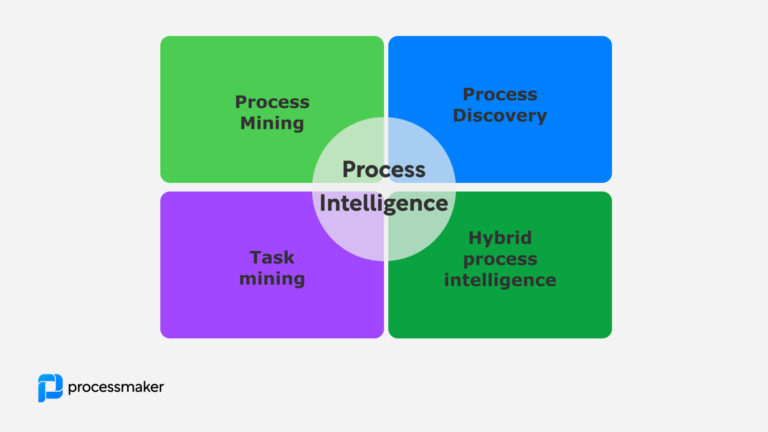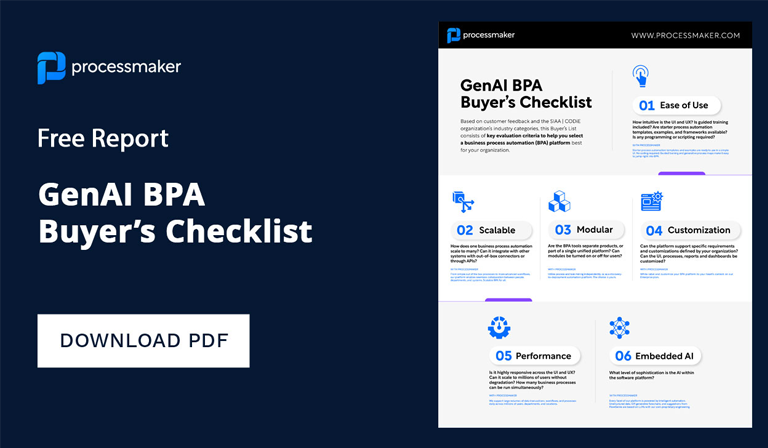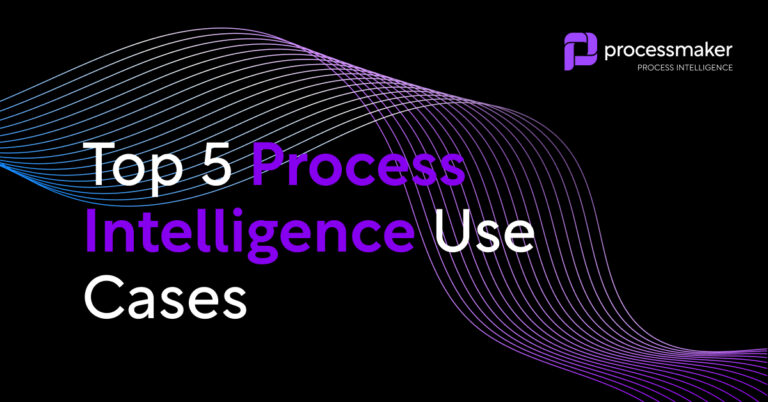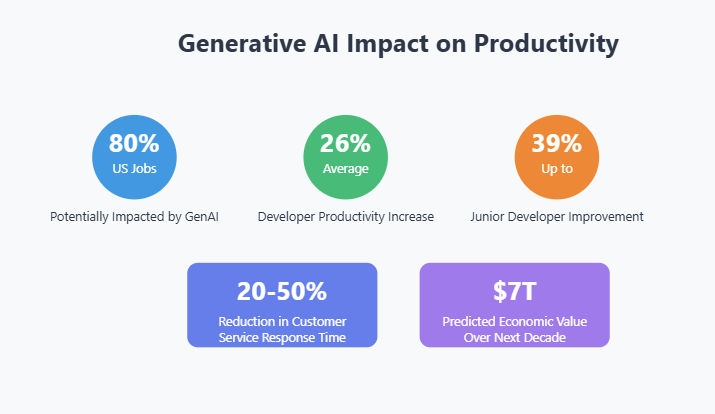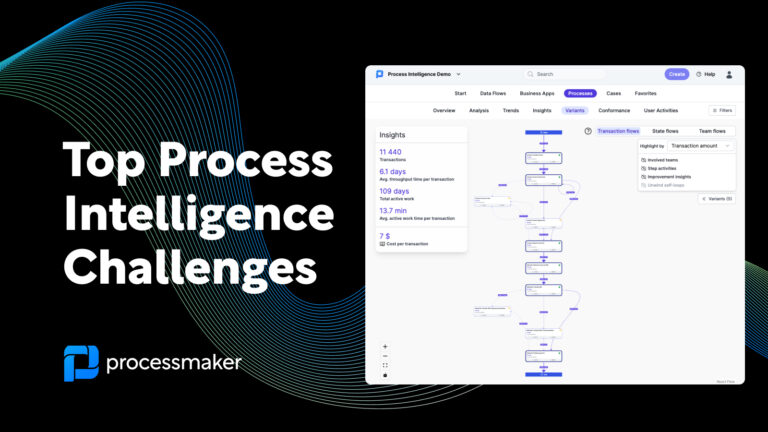In enterprise software, there are few software categories that are gaining as much interest as process intelligence software. Gartner estimates that the market has grown to over $ 1 billion in revenue by 2022 and could be set to triple in size over the next five years.
What are process intelligence tools?
Process intelligence is a broad category of software solutions that can include process mining, task mining, process discovery, and hybrid process intelligence tools.
Process intelligence tools provide insights into business processes by collecting, analyzing, and visualizing data from various sources such as ERP, CRM, and other systems. They enable organizations to identify inefficiencies, bottlenecks, and opportunities for improvement, ultimately enhancing their operational performance.
Today there are over 25 process intelligence tools and software solutions in the market with different unique strengths and applications. Broadly speaking, they all fit under the umbrella of solutions aimed at supporting process analysis and improvement in business operations.
What is process intelligence software?
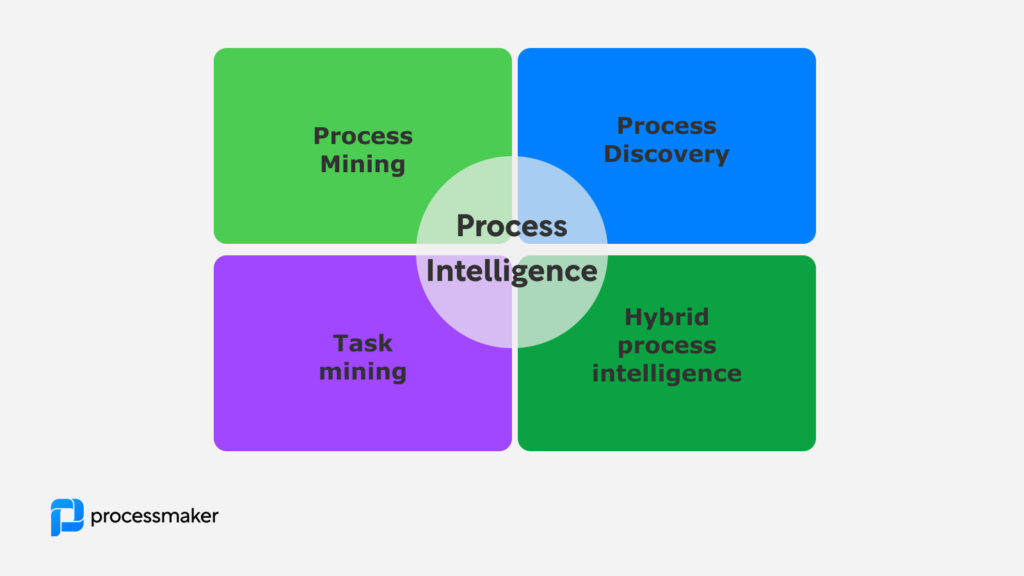
Infographic: what is included in process intelligence software
Categories of process intelligence software and tools
If you’re looking for a process intelligence tool you’re spoiled for choice. Your options include:
- Process mining software. Tools that extract process intelligence from event logs in enterprise resource systems.
- Task mining software that collects process information from the workstations of specific teams or groups of employees.
- Process discovery software. Tools that use either process mining or task mining to identify an as-is state of business processes.
- Hybrid process intelligence. Software that combines process mining, process discovery and/or task mining into the same solution.
- Self-built process analytics – manually created tools and dashboards e.g., using Microsoft Excel for data crunching and Tableau for data visualization.
Process intelligence vs. process mining
Process intelligence and process mining are two powerful methodologies used by businesses to analyze, optimize, and improve their operations. Although they share some similarities, they have distinct differences in terms of their approach, scope, and capabilities.
Process intelligence is a comprehensive approach to understanding and optimizing business processes by leveraging data and analytics. Process mining is a subset of process intelligence that focuses on analyzing event logs generated by information systems, such as ERP or CRM applications.
Differences between process intelligence and process mining
- Scope. Process intelligence covers a broader range of processes across an organization, whereas process mining focuses on specific processes that are captured in event logs.
- Data Sources. Process intelligence uses a wider variety of data sources, including structured and unstructured data, while process mining relies primarily on event logs from information systems.
- Approach. Process intelligence takes a more holistic approach to process analysis, encompassing process discovery, monitoring, optimization, and automation. Process mining, on the other hand, primarily focuses on process discovery and analysis.
- Capabilities. Process intelligence offers a wider range of capabilities, such as real-time monitoring, workflow automation, and advanced analytics. Process mining is more specialized, concentrating on the analysis of event logs to uncover process inefficiencies and bottlenecks.
Why are process intelligence tools important?
Process intelligence tools have become increasingly vital in today’s fast-paced and data-driven business landscape. They help organizations to better understand, optimize, and automate their workflows, leading to improved efficiency and decision-making.
Alternative to manual process analysis
While the different types of process intelligence software differ in how they work they all serve the same use-case of replacing manual process analysis.
Most companies today rely on tactical or expert-lead process analysis, where the insights are gathered through interviews of key stakeholders, 1-to-many surveys, tactical data crunching or process discovery workshops. While manual process analysis is the established best practice, it is often costly and difficult to scale up. As an alternative to this manual approach, process intelligence has a number of advantages.
Key benefits of process intelligence tools
- Improved operational efficiency. Process intelligence gives a data-driven benchmark for continuously improving operational excellence and efficiency based on KPIs and metrics that can be measured and influenced.
- Real-time monitoring. Unlike manual or project-based process analysis, automated process intelligence gives you a continuous stream of up-to-date data enabling real-time monitoring and improvement of processes.
- Cost reductions. Process intelligence provides insights to identify process waste and reduce the cost of inefficient workflows and processes.
- Risk mitigation. Process intelligence allows for the continuous monitoring of process conformance and reduces the risk of shadow processes.
Today, process intelligence is one of the key categories of intelligent automation software – with the analyst firm HFS Research citing it as the highest priority emerging technology for enterprise leaders.
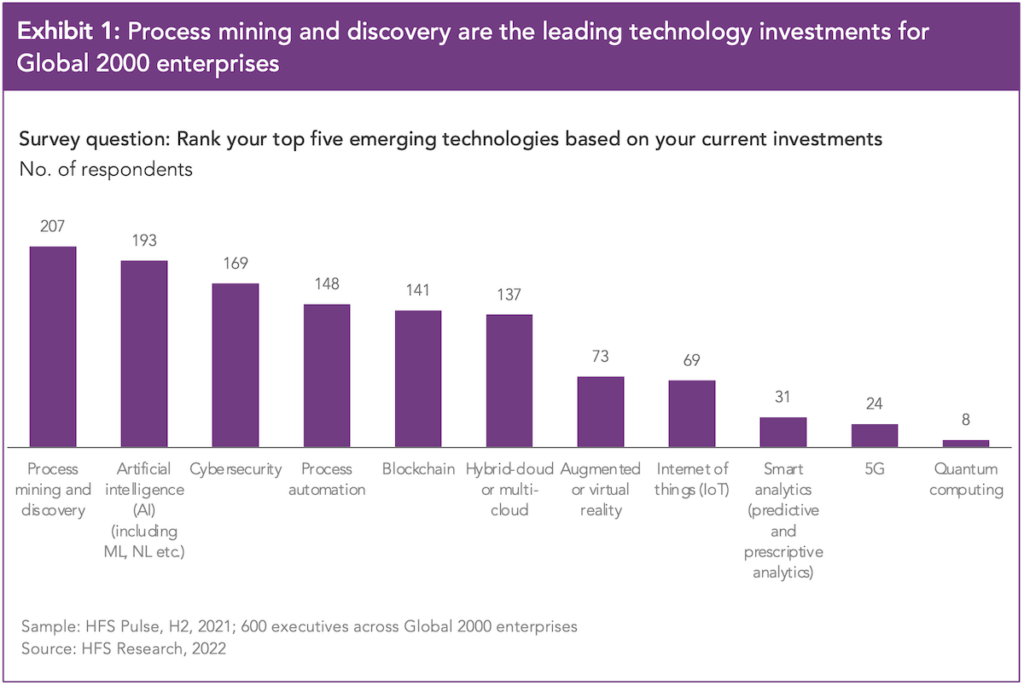
Source: HFS Research – The Meteoric Rise of Process Intelligence, 2022
Factors to consider when choosing process intelligence software
To ensure you choose the best process intelligence software for your organization, consider some of the following factors.
Robust Analytics and Reporting
Powerful analytics and reporting capabilities are key to unlocking the full potential of process intelligence. Choose a solution that offers advanced data analysis, real-time reporting, and customizable reports to help you make data-driven decisions.
Ease of Use and User-Friendliness
A user-friendly interface is crucial for ensuring widespread adoption of your process intelligence software. Look for a solution that is intuitive and easy to use, with features like drag-and-drop capabilities, customizable dashboards, and clear visualizations.
Customizability and Adaptability
Every organization has unique business processes and requirements. Choose process intelligence software that is easily customizable and adaptable to fit your specific needs, ensuring a tailored solution for your business.
Scalability and Flexibility
As your organization grows, it’s crucial that your process intelligence software can scale to accommodate increased demands. Choose a solution that offers scalability and flexibility, so you can adapt to changing business requirements without sacrificing functionality or performance.
Security and Compliance
Ensuring the security and compliance of your process intelligence software is critical for protecting sensitive business data. Look for a solution that provides robust security features, such as data encryption, access control, and regular security updates.
Total Cost of Ownership (TCO)
The total cost of ownership (TCO) for process intelligence software includes not only the initial purchase price, but also ongoing costs such as maintenance, support, and upgrades. To determine the TCO, consider factors like licensing fees, implementation costs, and training expenses.
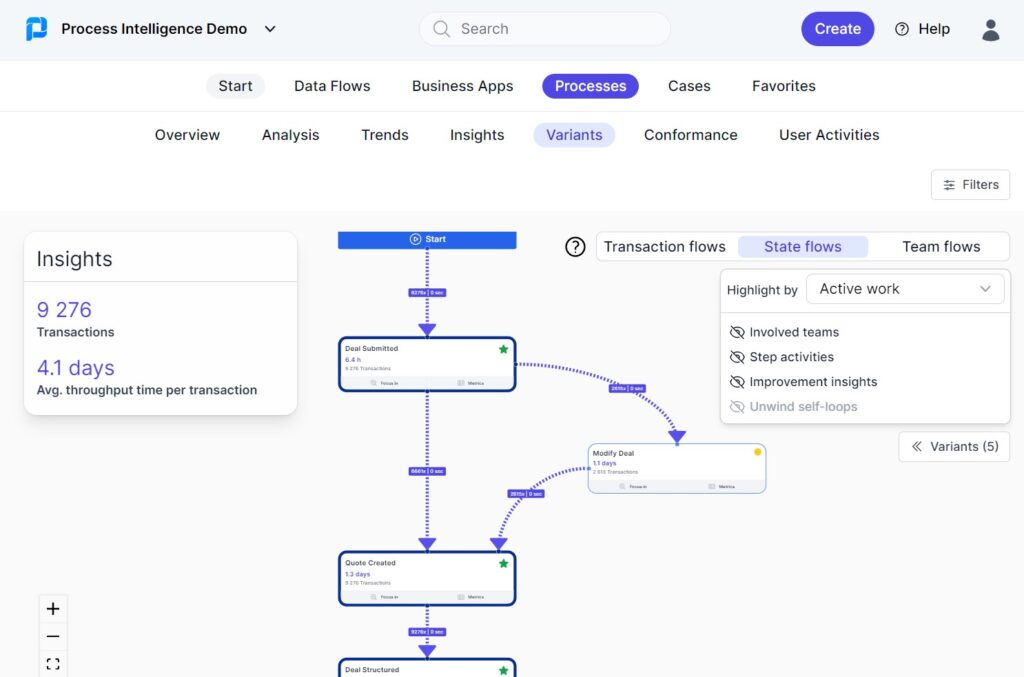
Process intelligence software example – process variants analysis
List of Top Process Intelligence Tools in 2024
#1. ProcessMaker Process Intelligence (PI)
ProcessMaker entered the process intelligence space fairly recently through the acquisition of a software company Workfellow. Workfellow was the first commercially available hybrid process intelligence solution combining process mining and task mining into one natively integrated and AI-powered solution. Workfellow, now ProcessMaker PI, has enterprise customers across different industries from logistics to consumer goods, and especially knowledge-intensive work including banking, financial services, and insurance.
Typically enterprise business customers uncover ~20% savings within 30 days of plug-and-play installation of ProcessMaker PI. Read a case study on how one medium-sized business process outsourcing (BPO) firm uncovered over € 2 million ($2.17 million) in process waste.
Key features of ProcessMaker PI
- Effortless implementation: ProcessMaker PI does not require access to event logs, instead it generates event logs automatically by collecting the data from the user interfaces.
- 360-degree analysis: ProcessMaker PI is able to track tasks and process flows across different business apps, allowing for end-to-end analysis of workflows.
- Automated insights: ProcessMaker PI includes ready-made dashboards and provides automated insights within its analytics.
- Privacy first: ProcessMaker PI is a GDPR-compliant solution that does not process personally identifiable data.
Who is it for?
ProcessMaker PI is a good option for any business or organization that doesn’t have extensive data science and process mining resources in-house looking for an effortless and fast way to gain process intelligence without data mining hassle.
#2. Celonis
Celonis is a popular software solution that helps enterprise organizations optimize their business processes. The different Celonis solutions are packed into the Execution Management System (EMS) – a platform that helps businesses analyze and visualize processes, identify bottlenecks and inefficiencies, and provide guidance on process improvements.
Celonis is an established market leader in process mining, offering a broad process intelligence platform including task mining and process modeling. Celonis was one of the first commercially available process mining vendors and is today a recognized market leader in the category. Since 2011 the company has grown rapidly and now has a market valuation of over $13 billion. Celonis has over 3000 customers and 20 offices, mostly in North America and Europe.
Key features of Celonis
- Focus on enterprise businesses: Celonis provides a high level of service, security, and data management for the needs of large enterprise organizations.
- Event log mining: Celonis has a large customer base and broad experience in extracting event logs from different source systems, especially popular ERPs such as SAP and Oracle.
- Wide partner network: Celonis has over 250 partner agencies that provide implementation consulting services.
Who is it for?
For many people, Celonis is synonymous with process mining, and a natural option to consider within the right costs and resources.
#3. UiPath Process Mining
UiPath is a major process automation and orchestration platform. It provides a suite of tools to help automate processes, including an easy-to-use visual workflow designer, a powerful robotic automation platform, and an AI-powered document understanding component.
UiPath is a pioneer in robotic process automation originally founded in Bucharest, Romania and now headquartered in New York. It is used by over 10,000 customers ranging from independent developers to large enterprise businesses such as Verizon and Takeda Pharmaceuticals. UiPath’s process mining solution has been developed based on the acquisition of ProcessGold in 2019.
Key features of UiPath
- Automation suite: All-in-one platform for automation including RPA, low-code app development, and integrations.
- Accessible and scalable: UiPath is relatively quick to start to use, starting from the free-to-try UiPath Cloud Platform.
- Training: Broad set of training materials for intelligent automation, including the UiPath Academy and certifications
Who is it for?
UiPath is well suited for an enterprise with a strong focus on RPA looking to advance its intelligent automation through a single-suite platform.
#4. IBM Process Mining
If you’re a believer in “you won’t get fired for buying IBM,” you’ll be glad to know that Big Blue offers its own process discovery and intelligence solution. Added to IBM’s portfolio in 2021 through an acquisition of MyInvenio, IBM Process Mining discovers, monitors, and optimizes business processes by extracting system data from enterprise systems.
Key features of IBM Process Mining
- Easy to use. IBM Process Mining has advanced process enhancement features that discover business rules based on event log data and add them to a standard BPMN model.
- Visualizations. IBM Process Mining offers a variety of visualization options relevant to process discovery, including process graphs, process variants, and conformance analysis.
- Process simulation. IBM Process Mining has process simulation features enabling to-be processes and what-if scenarios.
Who is it for?
IBM Process Mining is a good option for companies looking to build on IBM’s data and consulting expertise, especially with an interest in aligning business process management and design models with standard practices, such as BPMN models.
#5. Automation Anywhere / FortressIQ
Automation Anywhere is a major enterprise automation suite founded in 2003. Its process discovery and mining solution was integrated into the Automation Success Platform through the acquisition of FortressIQ in 2021.
Automation Anywhere is used extensively by large enterprise organizations across different geographies. It is especially known for combining elements of robotic process automation (RPA) and artificial intelligence (AI) to enable end-to-end automation of business processes.
Key Features of FortressIQ / AA Process Mining
- Integration to automation suite. FortressIQ is now embedded into Automation Anywhere’s intelligent automation offering.
- Task capture. FortressIQ leverages computer vision to capture screen activity for task mining and process discovery.
- Large enterprise client list. Both FortressIQ and Automation Anywhere have an impressive list of enterprise clients, including 4 Fortune 10 companies.
Who is it for?
FortressIQ initially gained traction with contact centers serving North American clients. It is a potential option for automation-focused enterprises in regions where task capture and personal data privacy are less of an issue.
#6. SoftwareAG / Aris Process Mining
Aris Process Mining is a solution developed by Software AG, an enterprise software vendor founded in Darmstadt, Germany in 1969. Software AG has over 10,000 enterprise customers in over 70 countries.
Aris Process Mining was one of the first commercial process mining tools originating in 2000. Its core advantage is deep integration with business process modeling and enterprise architecture design.
Key Features of Software AG / Aris Process Mining
- Interactive root-cause analysis: Aris Process Mining includes unique automated root-cause mining and insights.
- Process modeling: process models can be enhanced by real performance measures.
- Process Performance Management (PPM): a tool to manage business processes based on process mining and analytics insights.
Who is it for?
Customers find value in Software AG’s broad ecosystem of solutions and partners across various geographies.
#7. Microsoft Minit
Microsoft is an enterprise software provider that needs no introduction. What’s less well known is that Microsoft has an increasing solution offering in enterprise automation through it’s Power Platform.
In 2022 Microsoft acquired Minit, a best-of-breed process mining solution based in Bratislava, Slovakia. As of 2023, Microsoft has signaled plans to integrate Minit into its service offering.
Key Features of Minit
- Out-of-the-box templates: Minit has the capabilities to offer faster-than-average process mining implementation through ready-made integration and visualization templates.
- User-friendly solution: According to customer feedback Minit is a relatively easy to implement solution without the typical need for data science and data mining expertise.
- Integration to Microsoft ecosystem: the opportunity ahead is for Minit process mining capabilities to be deeply integrated into Microsoft’s other intelligent automation capabilities.
Who is it for?
If you are a true believer in the Microsoft ecosystem and are looking to build your process intelligence stack on Microsoft’s track record in integrating best-of-breed solutions, Microsoft Minit may be for you.
#8. Fluxicon Disco
Disco is a process mining solution offered by Fluxicon, a company with a background in academic research in process and data mining. Fluxicon first started to explore process mining technology in the late 1990s and is one of the first process mining solutions available on the market.
Key features of Fluxicon Disco
- Simple licensing: Fluxicon keeps its pricing model simple for Disco, including a basic annual license for unlimited process events.
- Community connections: through its background in academia, Fluxicon has an active community of developers.
- Niche focus: compared to larger process mining vendors Fluxicon’s service offering is relatively narrow.
Who is it for?
Disco is a process mining solution for anyone looking to enter the market with relatively low commitments and costs.
#9. Appian
Appian is an established enterprise software vendor founded in 1999. Its business process management suite traces back to 2004. It is known for being an end-to-end workflow management solution with service-focused enterprise organizations, including BFSI and government agencies.
Appian’s process mining solution was developed through the acquisition of Berlin-based Lana Labs in 2021. The software utilized Artificial Intelligence (AI) and Machine Learning (ML) technologies to analyze data from various sources such as ERP systems and log files, to provide a visual representation of the process flow.
Key features of Lana Labs / Appian Process Mining
- End-to-end BPM: Through the integrated BPM and process mining solution Appian can provide the tools to analyze and manage business process improvement.
- Focus on services: Appian specializes in service-based enterprises, such as banking, financial services, and government institutions.
- BPMN integration: the ability to align process design with business process modeling standards.
Who is it for?
Appian has a special focus on the North American region and could be a good fit for large enterprise service companies.
#10. ProM (Process Mining framework)
If you have the resources and skills in your organization to develop your own process mining tool, you may consider ProM, which is short for Process Mining framework.) ProM is an open-source framework for process mining algorithms. In other words, it is a free and independent resource for users and developers to leverage when building process mining capabilities.
#11. ABBYY Timeline
ABBYY Timeline can be broken down into three steps: recording, analysis, and recommendations. The scalable and nonintrusive technology captures variations in how tasks are performed over a large period of time to enable large teams of desktop users to see variations in user interaction paths.
ABBYY Timeline also protects privacy with OCR technology that removes sensitive information. After gathering and analyzing information, the technology recommends tasks for automation based on length of time, repetition, and complexity. By doing this, ABBYY Timeline helps organizations scale high-value automation and build transformation plans.
With ABBYY’s task mining technology, users can identify:
- Tasks worth automating
- Possible tasks to automate
- Automation’s effects on processes
- Tasks that waste time
- The best set of tasks necessary to complete work.
#12. StereoLOGIC
StereoLOGIC offers an integrated process mining and task mining platform focused on digital transformation. It is originally based on task capture technology extracting and mapping employee tasks from the employee user interface.
StereoLOGIC is based in Toronto, Canada, and was founded by entrepreneurs with an intelligent automation background previously from Blueprint Systems.
The technology precisely extracts and maps employee tasks without requiring desktop installation. Even if employees regularly stop these jobs as they go from one to the next, StereoLOGIC will still give precise documentation and analytics data for each task.
StereoLOGIC also offers:
- Detailed, specific details on each task
- Elimination of noise, including interruptions and diversions from employees, which often skew task mining
- Identification of inefficiencies and activities that don’t offer value
- Deletion of confidential client and staff data
#13. ActiveOps
ActiveOps is a helpful tool for the post-pandemic way of working. It brings order and insights into remote work by adding to established process and task mining technologies to enable system managers to look after and steer work in decentralized workplaces.
Active Ops is a methodology rather than technology. It’s centered around Active Operations Management (AOM) methodology to provide forecasting, planning, and optimization. With this in mind, ActiveOps is best utilized by companies who already recognize what processes they wish to improve.
The ActiveOps “collector” integrates with HR systems and provides insights into team performance to offer the following benefits:
- Better communication between HR and performance management
- Automation of skills and work management
- Helps large organizations grasp the implications of remote working
- Brings order into the new world of hybrid working
#14. Fujitsu Automated Process Discovery
The Fujitsu Automated Process Discovery (APD) service helps organizations visualize their existing business processes using an evidence-based approach with analytical and actionable insight to maximize the value of process improvement initiatives. Unlike traditional business process discovery efforts, where models are created after a multitude of interviews with task or process owners, the APD service relies on facts and evidence within company application log files to trace the process and render the flow “as it really happens”.
Key features of Fujitsu APD
- Out-of-the-box metrics: ability to measure compliance, inefficiency cost, and process optimization opportunities.
- Consulting focus: as part of the Fujitsu APD service experience clients get advice on areas of improvement and implications.
- Aligned with BPM: aligned with standards-based process modeling techniques.
Who is it for?
Global 1000 companies that have a working relationship with Fujitsu or are looking for integrated consulting + software experience to process discovery.
#15. Nintex
Nintex is a leader in end-to-end process intelligence and workflow automation with over 10,000 customers. It has expanded its process discovery and mining functionality in 2022 through the acquisition of Kryon.
Kryon’s Process Discovery solutions were considered best-of-breed solutions at the time of the acquisition, especially with unique computer vision features for event capture on user interfaces. In addition, Kryon offered robotic process automation (RPA) functionality under Kryon RPA.
Key features of Nintex Process Discovery
- End-to-end visibility. The process discovery element is based on computer vision task capture from users’ computers and workstations.
- Automation capabilities. The Kryon suite offers complimentary process discovery and RPA functionality to identify and execute automation projects.
- Long-established suite. Nintex has the stability and stature of a long-established automation suite tracing back to the early days of enterprise automation in 2006.
Who is it for?
Nintex has a broad customer base in services, manufacturing, and retail industries and can be a good option for any business considering an automation-focused, established vendor.
#16. Mehrwerk Process Mining
Mehrwerk is a process mining solution built on the Qlik Sense business intelligence platform. It offers comprehensive process mining capabilities and combines self-service functionality process visualizations.
Key functionalities of Mehrwerk ProcessMining (MPM):
- Business intelligence integration: MPM is integrated into Qlik Sense for modern business intelligence visualizations.
- Self-service analytics: flexibility of dashboards with the ability to create and modify charts.
- Data extraction: over 100 connectors leveraging the ETL functionality offered by Qlik.
#17. QPR Process Mining
QPR Software is one of the first vendors to offer process mining functionality. Its ProcessAnalyzer offers broad analytical functionality, customizable dashboards and enhanced BPMN modeling.
Key functionalities of QPR ProcessAnalyzer:
- Integration to Snowflake: QPR utilizes Snowflake for cloud data storage.
- Data extraction: QPR has a long history of ETL capabilities for process mining.
- On-premise solution: QPR can also offer process mining for on-premise installations.
#18. BusinessOptix
BusinessOptix is a US-based Process Transformation suite offering end-to-end process transformation tools including process mining functionality. Its process mining solution is offered as part of a cloud-based platform for transforming business processes in areas such as customer experience (CX).
Key functionalities of BusinessOptix:
- Discovery: BusinessOptix provides capabilities to discover as-is processes.
- Process mapping and modeling: BusinessOptix offers solutions aligned with business process modeling (BPMN).
- Process simulation: BusinessOptix is capable of developing simulations of processes.
#19. Apromore
Apromore is a process mining solution with deep links to the academic sector founded by university professors. It offers a free version of its software for education and research purposes.
- Free version: Apromore offers access to its Enterprise Edition SaaS product free of charge for students and researchers.
- Salesforce integration: Apromore has received funding from Salesforce and is an official partner of Salesforce.
- Academic connections: Apromore has strong connections to academia, including the University of Melbourne.
#20. Pega / Pegasystems
Pegasystems Inc. is a software company that develops customer relationship management (CRM) and business process management (BPM) software solutions. Founded in 1983, their suite of solutions is focused on improving customer engagement, operational efficiency, and business growth.
Pegasystems’ solutions intelligent automation solutions include a process mining solution developed by Everflow that can help businesses analyze, automate, and optimize business processes.
#21. iGrafx
iGrafx is a business process management (BPM) software company founded in 1987 and based in Oregon, US that specializes in helping enterprise organizations optimize their operations.
The iGrafx Business Process Optimization platform helps to identify and analyze processes, model processes, and ultimately automate them. iGrafx offers process intelligence solutions through the acquisition of Logpickr – a process mining vendor based in France.
#22. Inverbis
Inverbis is a process mining and value stream mining company based in Spain. InVerbis is developed as part of an incubation and technology transfer from CiTIUS, the Research Center on Intelligent Technologies at the University of Santiago.
#23. Process.Science
Process.science is a process mining solution focusing on the Qlik and Power BI business intelligence platform based out of Germany. Through an integration with popular BI solutions, Process.Science can offer relatively low-cost process mining functionality.
#24. Soroco
Soroco is a task mining solution focused on developing a Work Graph solution focused on aiding digital transformation. The platform includes both task discovery and process discovery functionality.
The owner and founder of Soroco Rohan Murthy is the son of Infosys founder N. R. Narayana Murthy.
#25. QAD / Livejourney
Livejourney was a process mining software company founded in France in 2015. The company was acquired by QAD in 2022 and is currently marketed under the name QAD Process Intelligence.
QAD is an enterprise resource planning (ERP) software company focused specifically on manufacturing clients. Their software solutions help manufacturers manage their entire operations, from customer relationship management (CRM) to production and operations.
#26. Mindzie
Mindzie is a process mining company founded in 2020 based out of Texas, US focused on mid-size businesses. It offers a low-code process mining solution either on cloud or desktop installations.
Bottom line
Today there are many process intelligence solutions available to fulfil your needs. Whether you are looking for process mining software, task mining tools, or automated process discovery, you’ve got a variety of software solutions to choose from.
Once you have explored your options, it’s time to narrow down your alternatives and identify the best solution for your needs. Next up, read research on what kind of repetitive tasks and processes could be automated in your organization.
Frequently asked questions about process intelligence
1. What is process intelligence?
Process intelligence is the use of business intelligence strategies and technologies in business process management. Process intelligence can be used to remove bottlenecks or improve operational efficiency, and it can be used as a catalyst for business process re-design.
2. What is intelligent process automation?
Intelligent automation is the use of technology such as artificial intelligence (AI) and robotic process automation (RPA) to automate mundane, repetitive tasks. Intelligent automation streamlines processes, cuts costs, and improves the efficiency of business operations.
3. What is the difference between process intelligence and process mining?
Process intelligence is a comprehensive approach to understanding and optimizing business processes by leveraging data and analytics. Process mining is a subset of process intelligence that focuses on analyzing event logs generated by information systems, such as ERP or CRM applications.
4. What is the difference between process intelligence and business intelligence?
Business intelligence (BI) is a technology-driven methodology used to analyze data and transform it into actionable insights for informed decision-making. Process intelligence is the subset of business intelligence focused on process analysis and improvement using business intelligence methodologies.
